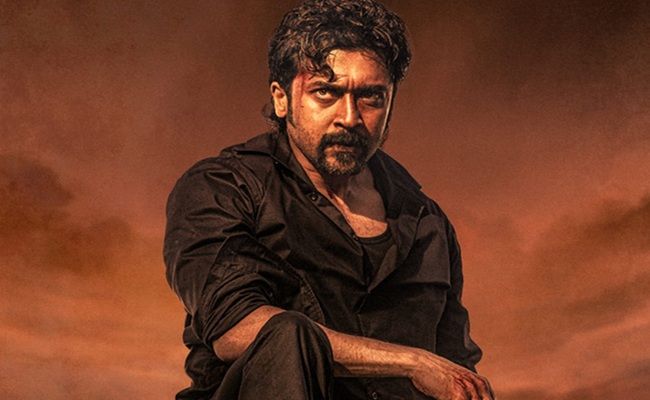
Movie: Retro
Rating: 2/5
Banner: 2D Entertainment, Stone Bench Films
Cast: Suriya, Pooja Hegde, Jayaram, Karunakaran, Joju George, Nasser, Prakash Raj, Shriya Saran, and others
Music: Santhosh Narayanan
DOP: Shreyaas Krishna
Editor: Shafique Mohamed Ali
Art: Jacki, Mayapandi
Stunts: Kecha Khamphakdee
Producers: Jyothika, Suriya
Written and Directed by: Karthik Subbaraj
Release Date: May 01, 2025
Suriya has recently faced a series of flops. In an attempt to break away from his usual formula, he joined hands with director Karthik Subbaraj, known for his unconventional storytelling. But did their collaboration strike the right chord?
Let’s find out.
Story:
Pari (Suriya) is adopted by Sandhyamma, the wife of a ruthless gangster, Thilakan (Joju George). While Sandhyamma raises him as her own, Thilakan never accepts him as a son. After Sandhyamma’s untimely death, Pari grows up under Thilakan’s shadow. During his time in Kashi, young Pari meets Rukmini, a girl who, like him, has lost her mother.
Years later, Pari rises through the ranks to become Thilakan’s most trusted henchman. Fate reunites him with Rukmini (Pooja Hegde), and the two fall in love and decide to marry. Pari promises to leave his life of crime behind for her.
However, on their wedding day, Thilakan demands that Pari reveal the location of a hidden stash of smuggled gold. When Pari refuses, Thilakan responds with a brutal attack. The betrayal creates a deep rift between them, and a disillusioned Rukmini walks away, unable to bear the violence.
Now, Pari must go to extraordinary lengths to win Rukmini back. But how far is he willing to go for love?
Artistes’ Performances:
Suriya carries the film on his shoulders, delivering a powerful performance that reminds audiences of his impressive acting range after a brief hiatus. He shines in the emotional moments of the first half and transitions effortlessly into action in the second.
Pooja Hegde delivers a solid performance in a relatively challenging, deglamorized role, which she handles with poise and grace.
However, not all supporting performances land well. Nassar and his son, who portray island kings, come across as over-the-top and occasionally irritating. Jayaram’s portrayal of the quirky Dr. Chaplin also veers into caricature.
Technical Excellence:
Santhosh Narayanan’s background score and Shreyaas Krishna’s cinematography stand out as the stronger aspects of the film’s technical craft. However, the editing lacks precision—several scenes could have been trimmed to maintain a tighter narrative.
The second half feels sluggish and meandering, with the pacing dragging the film down. The writing also falters, with many sequences coming across as confusing or poorly explained.
Highlights:
Suriya
The single-shot sequence
Drawback:
Confusing narrative
Lack of emotional grip
Entire second half is mess
Analysis
"Retro" begins in the 1960s and concludes in the 1990s. This period drama opens on a promising note, tying the protagonist’s journey to Lord Krishna. The film is divided into multiple chapters — Love, Laugh, War, The One, and so on. While the Love and Laugh segments are dull, the rest of the narrative severely tests the viewer’s patience.
Early in the film, the wedding sequence between Suriya and Pooja Hegde stands out. This nearly 15-minute single-shot scene — blending song, emotional drama, and action—is riveting. But soon after, the narrative begins to lose its grip.
The story then shifts to an island where people rarely laugh, mirroring Suriya’s emotionally restrained character. Jayaram enters as a quirky doctor, but from this point on, the film starts to feel clumsy and disjointed. By the interval, it’s gearing up for an all-out war.
The second half plunges into mythology, tribal culture, and a bizarre cult that enjoys watching others suffer — reminiscent of Gladiator-style combat. However, the story keeps cutting between Joju George, Prakash Raj, Nasser and his son, and the Suriya-Pooja track, making it mentally exhausting to follow.
The film attempts to juggle too many layers, but fails to fully develop any of them. As it moves forward, the plot fizzles out and eventually becomes a full-blown headache.
What’s baffling is that Suriya, who already faced a major setback with a similar tribal-period film (Kanguva), chose to immediately sign on for another project in the same vein instead of opting for a simpler, more grounded, and relevant script.
The biggest issue with Retro is its lack of coherence. Even the love story between Suriya and Pooja Hegde feels forced as the film progresses — despite the two having strong screen presence.
Ultimately, the only saving grace in Retro is Suriya himself. The rest of the film sinks into an island of hollowness.
Bottom-line: Tests Patience














